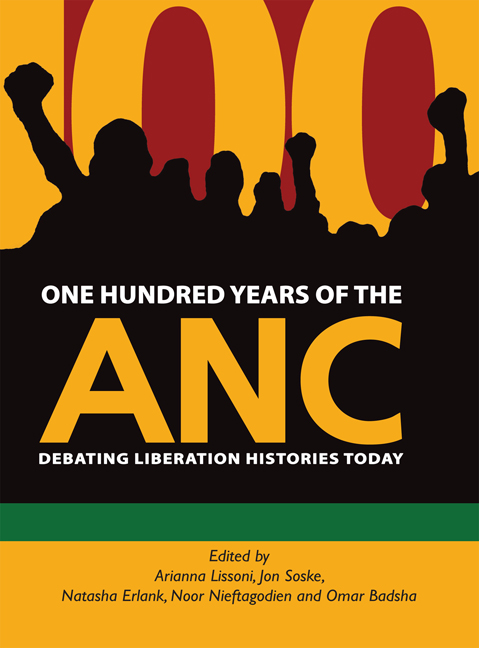Book contents
- Frontmatter
- Contents
- Acknowledgements
- Editorial Note
- FIRST KEYNOTE ADDRESS: Fragmentation and Cohesion in the ANC: The First 70 Years
- SECOND KEYNOTE ADDRESS: A Continuing Search for Identity: Carrying the Burden of History
- Chapter One One Hundred Years of the ANC: Debating Struggle History After Apartheid
- Chapter Two Religion And Resistance In Natal, 1900–1910
- Chapter Three Christianity and African Nationalism in South Africa in the First Half of the Twentieth Century
- Chapter Four Charlotte Maxeke: A Celebrated and Neglected Figure in History
- Chapter Five Imagining the Patriotic Worker: The Idea of ‘Decent Work’ in the ANC's Political Discourse
- Chapter Six Popular Movements, Contentious Spaces and the ANC, 1943–1956
- Chapter Seven Unravelling the 1947 ‘Doctors’ Pact’: Race, Metonymy and the Evasions of Nationalist History
- Chapter Eight The Politics of Language and Chief Albert Luthuli's funeral, 30 July 1967
- Chapter Nine Robben Island University Revisited
- Chapter Ten Shishita: A Crisis in the ANC in Exile in Zambia, 1980–811
- Chapter Eleven Comrade Mzwai
- Chapter Twelve Revisiting Sekhukhuneland: Trajectories of Former UDF Activists in Post-Apartheid South Africa
- Chapter Thirteen Regeneration of ANC Political Power, from the 1994 Electoral Victory to the 2012 Centenary
- Chapter Fourteen The ANC: Party Vanguard of the Black Middle Class?
- Chapter Fifteen Globalisation, Recolonisation and the Paradox of Liberation in Southern Africa
- Contributors
- Index
Chapter Six - Popular Movements, Contentious Spaces and the ANC, 1943–1956
Published online by Cambridge University Press: 21 April 2018
- Frontmatter
- Contents
- Acknowledgements
- Editorial Note
- FIRST KEYNOTE ADDRESS: Fragmentation and Cohesion in the ANC: The First 70 Years
- SECOND KEYNOTE ADDRESS: A Continuing Search for Identity: Carrying the Burden of History
- Chapter One One Hundred Years of the ANC: Debating Struggle History After Apartheid
- Chapter Two Religion And Resistance In Natal, 1900–1910
- Chapter Three Christianity and African Nationalism in South Africa in the First Half of the Twentieth Century
- Chapter Four Charlotte Maxeke: A Celebrated and Neglected Figure in History
- Chapter Five Imagining the Patriotic Worker: The Idea of ‘Decent Work’ in the ANC's Political Discourse
- Chapter Six Popular Movements, Contentious Spaces and the ANC, 1943–1956
- Chapter Seven Unravelling the 1947 ‘Doctors’ Pact’: Race, Metonymy and the Evasions of Nationalist History
- Chapter Eight The Politics of Language and Chief Albert Luthuli's funeral, 30 July 1967
- Chapter Nine Robben Island University Revisited
- Chapter Ten Shishita: A Crisis in the ANC in Exile in Zambia, 1980–811
- Chapter Eleven Comrade Mzwai
- Chapter Twelve Revisiting Sekhukhuneland: Trajectories of Former UDF Activists in Post-Apartheid South Africa
- Chapter Thirteen Regeneration of ANC Political Power, from the 1994 Electoral Victory to the 2012 Centenary
- Chapter Fourteen The ANC: Party Vanguard of the Black Middle Class?
- Chapter Fifteen Globalisation, Recolonisation and the Paradox of Liberation in Southern Africa
- Contributors
- Index
Summary
INTRODUCTION
During the 1940s and 1950s, two principal components of black resistance in South Africa, namely, local popular movements and political organisations, underwent profound transformation and radicalisation. Both were rejuvenated, became demonstrably defiant and assumed mass characters, albeit with considerable geographical and temporal variations. New layers of the black urban working class participated in various forms of protest, from individual to collective and organised acts of defiance. Urban areas and especially the places in which the rapidly growing urban working class lived – locations, freehold townships and squatter camps – became the primary centres of resistance. The chapter proceeds from the premise that popular movements and political organisations both contributed significantly to shaping resistance politics. While this may be self-evident, the historiography of liberation movements in South Africa, especially in the past two decades, has tended to elevate the role of political organisations at the expense of popular movements. In its current form, and despite routine disclaimers, the hegemonic narrative of liberation history has become virtually synonymous with the history of the African National Congress (ANC). Institutional histories and the proliferation of struggle biographies have arguably reinforced this approach.
A linear history of the ANC (and, by extension, of the liberation struggle) has been produced. It is one of constant progression from the launch of the ANC Youth League (ANCYL) in 1944 and the adoption of the Programme of Action in 1949 to the organisation's apparently ineluctable march from one campaign to the next, continually scaling new heights in its transformation into a mass movement and very rapidly reaching the summit of 100 000 members at the end of the Defiance Campaign in 1952. The decade from the mid-1940s to the mid-1950s is thus perceived as a critical turning point in liberation history but has generally been interpreted uncritically.
Unevenness in the development of struggle, setbacks and the absence of overt resistance are elided or presented as minor detours on the path to power. Such a teleological narrative arguably suppresses alternative histories of the rich and dynamic processes that configured resistance politics during the period under discussion. In this dominant rendition of liberation history, popular protest movements are either subsumed under the ANC's history or, in the case of the struggles of the 1940s, portrayed as overtures to the subsequent decade of mass defiance led by the ANC.
- Type
- Chapter
- Information
- One Hundred Years of the ANCDebating Liberation Histories Today, pp. 135 - 162Publisher: Wits University PressPrint publication year: 2012



